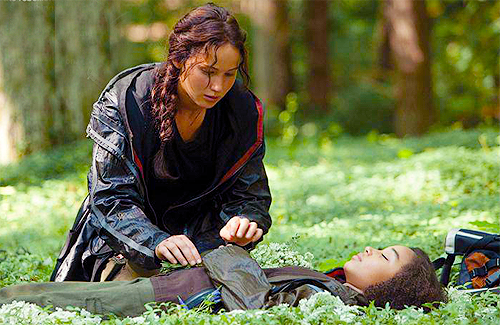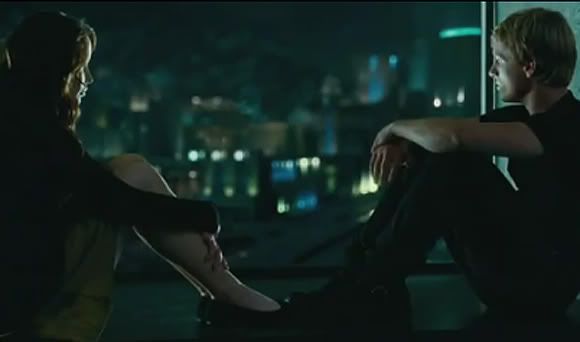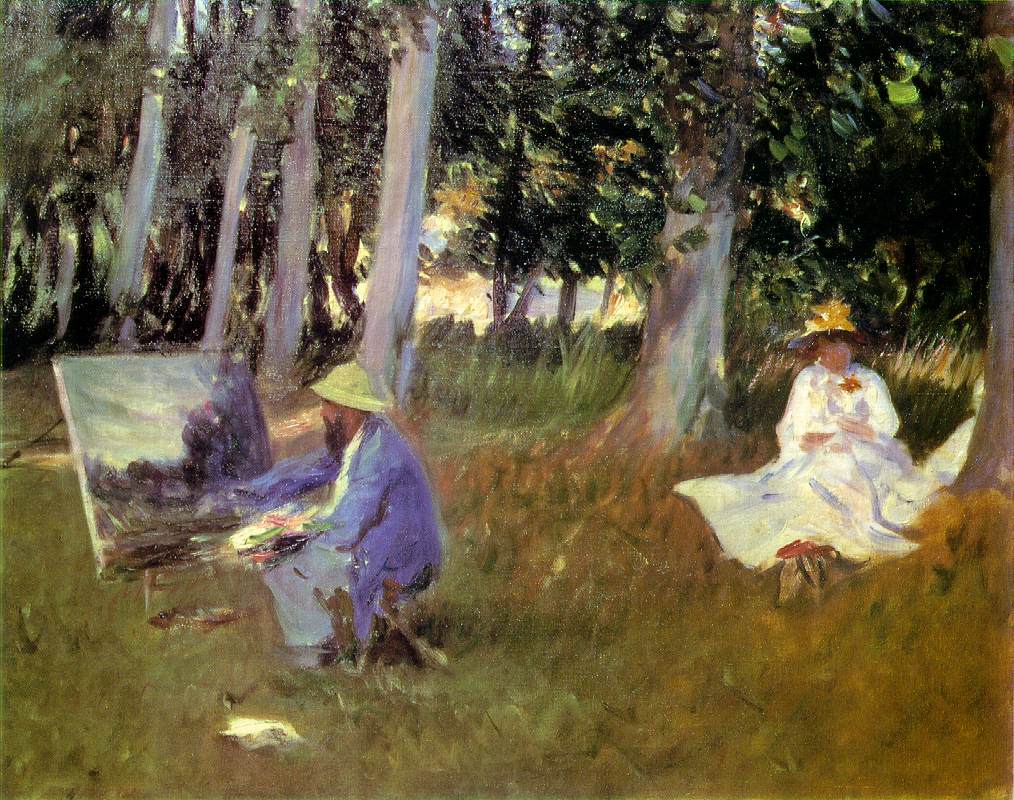My thoughts on The Hunger Games
*Even though I’m probably the last person who cares to have read these books, just to be fair: SPOILER ALERT!!!
 Full disclosure: After I read the first book in this series, I was fully prepared to despise and condemn the entire thing. Admittedly, I am not very familiar with young adult literature. I thought that to call the writing mediocre would be a compliment, and the popularity of a dark and violent story made me nervous. Typically, I am one of the last people to react against literature with dark undertones or “unhappy” endings (if I had to pick a favorite author, one I might name would be Thomas Hardy, a man notorious for his hopeless characters and depressing depictions of humanity). However, I do take issue with an audience that indiscriminately enjoys darkness, particularly violence, without heeding a deeper purpose or seeking to understand their own fascination. I have heard the series condemned for violence that is not fully understood and praised for no merit aside from an “interesting plot.” I have actually heard and read comments from Christians who said that the book was okay because, even if it is violent, it is free of sex and nudity and “the really bad stuff.” These kinds of attitudes have frustrated me before, and after reading the first novel, I was ready to quit. I struggled to understand what it was exactly that was drawing people to both the book and the movie. After the first book, I thought that all I held in my hands was a weak and poorly developed character who entertained readers with her fight for survival in very much the same way the Hunger Games entertained those people sitting comfortably in their lives in the Capitol.
Full disclosure: After I read the first book in this series, I was fully prepared to despise and condemn the entire thing. Admittedly, I am not very familiar with young adult literature. I thought that to call the writing mediocre would be a compliment, and the popularity of a dark and violent story made me nervous. Typically, I am one of the last people to react against literature with dark undertones or “unhappy” endings (if I had to pick a favorite author, one I might name would be Thomas Hardy, a man notorious for his hopeless characters and depressing depictions of humanity). However, I do take issue with an audience that indiscriminately enjoys darkness, particularly violence, without heeding a deeper purpose or seeking to understand their own fascination. I have heard the series condemned for violence that is not fully understood and praised for no merit aside from an “interesting plot.” I have actually heard and read comments from Christians who said that the book was okay because, even if it is violent, it is free of sex and nudity and “the really bad stuff.” These kinds of attitudes have frustrated me before, and after reading the first novel, I was ready to quit. I struggled to understand what it was exactly that was drawing people to both the book and the movie. After the first book, I thought that all I held in my hands was a weak and poorly developed character who entertained readers with her fight for survival in very much the same way the Hunger Games entertained those people sitting comfortably in their lives in the Capitol.
Amazingly enough it was seeing the movie that first started to change my mind about the series; and, by the end of the third and last book, I was actually impressed.

Honestly, I had very little desire to see the movie. I was disgusted with the popularity of what I saw as a pointlessly bloody story and was squeamish at the thought of watching teenagers battle to the death on-screen. Social media sites were blowing up with people excited about both the book and the movie version of The Hunger Games, and I’m not one to be thrilled about jumping on a blockbuster band wagon. But it was one of those things where I wanted to hang out with some friends for a “girls’ night out” and the movie was the general consensus. Not being one to argue, I sucked it up, bought my ticket for opening weekend, and dreaded the movie for two weeks. By the time the night came, I was half way through the second book and increasingly frustrated with myself for not being able to see what the draw was, but also frustrated with my own fascination with the plot line.
I think the reason I ended up appreciating the movie so much was the simple fact that they took the dark violence of the book and did not try to lighten it for a PG13 film. The violence was violent, though not gory; and the characters realistically struggle with their plight. In my mind, movie does not necessarily merit the “team Gale, team Peeta” Twilight mentality that has been forming amongst the more immature fans.
The movie was admirable, the audiences less so. I am disheartened by the number of people treating the story in the very way the novel actually does a decent job speaking against. Not only are people taking sides in a relatively unimportant romance, but I’ve heard stories of theatre audiences who actually cheered for the deaths of other competitors in the on-screen version of the first novel. In general, people are not searching for the deeper meaning of the text, which is really pretty obvious by the end, but are instead allowing themselves to be entertained by the very dark violence that the series attempts to depict as despicable, if sometimes inescapable.
For the sake of time and the purpose of not boring you to death with my ranting against peoples’ inhumanity, allow me to simply conclude with my thoughts on the ending of the series that so pleasantly took me by surprise.
I have heard the ending condemned for being too harsh and unhappy, but I would almost argue that it is perfect. I believe readers are attracted to Katniss because she is the imperfect anti-hero, and in the end it could be argued that she is not the hero of the series at all. Katniss is thrown into a position where she is fighting for her survival and that of her family. She is moral enough to not want to kill Peeta outright and eventually appreciate his efforts to keep her alive enough to return the favor. But she is quite literally a pawn in the games of the Capitol and District Thirteen, and this is the problem she struggles with as she also tries to survive and develop into a fully self-conscious character. Katniss has too many flaws to be a true hero and does not begin her process of healing from her violent existence until the end of the series when it seems like everything has actually fallen apart. Some may argue that the point of Katniss’s healing and self-awareness comes when she kills Coin instead of Snow, or when she realizes that she is truly in love with Peeta. However, though I think it is a combination of events, I believe Katniss’s healing begins to be most evident when she realizes that, though he has been vital to her existence and survival, Katniss is better off without Gale. There is no “team Peeta” and “team Gale” because, in the end, Katniss must be with Peeta if the revolution has truly worked to draw her closer to the altruistic nature that humanity is to strive for. Gale represents the violence of the revolution with his brutal reaction against the cruelty of the Capitol. However, by reacting with hatred and violence, Gale continues to kill the innocent, possibly even Katniss’s sister, Prim. This is also the way that Katniss tries to react, and she would likely continue in hatred and with violence if not for the gentle and peaceful nature of Peeta. Peeta is not shy about focusing on survival, but neither does he allow hatred to overcome him except when unnaturally forced by the Capitol torture, and even this he eventually overcomes. Katniss cannot realize that it is Peeta she needs until she has been completely broken to a point where only his gentleness can begin a process of healing. But first, Katniss had to let go of the violence that was the initial inclination of humanity. Just as humanity is evolving for oppression to revolution to peace, Katniss must go through the same process. If she becomes stuck in the “Gale stage,” she will only begin the cycle of violence and hatred again and again. It is Peeta who is arguably the true hero and his attitude that promises the salvation of humanity. 
By the end of the series, I realized that it is not the violence and survival story that is important, and this should not be what is drawing audiences. The series has a number of important themes, but a main one is certainly speaking for humanity’s healing from oppression and violence rather than the continuance of the same. The series shows (though not perfectly) a cycle that must be broken rather than continued with reactions that are always the same story of death and destruction. Katniss and Peeta and their children are the beginning of a new evolution of humanity that remembers cruelty but does not enact it in order to have freedom. The books are not about simply surviving “the Hunger Games” but actually breaking free from them in order to gain a new type of prosperity.
I only hope that as the second and third movies are made, audiences will come to better understand the meaning of the series instead of mindlessly taking them in as the very entertainment they should cause people to react against. Perhaps this is wishful thinking to assume of our western culture that has been saturated with the “okay-ness” of violence and war in society. I suppose the least I can do is to call for anyone reading this to please think more critically not only about these books, but about your reaction to any form of popular “art” or entertainment as these are the things that often drive our perception not only of the world but of ourselves.




